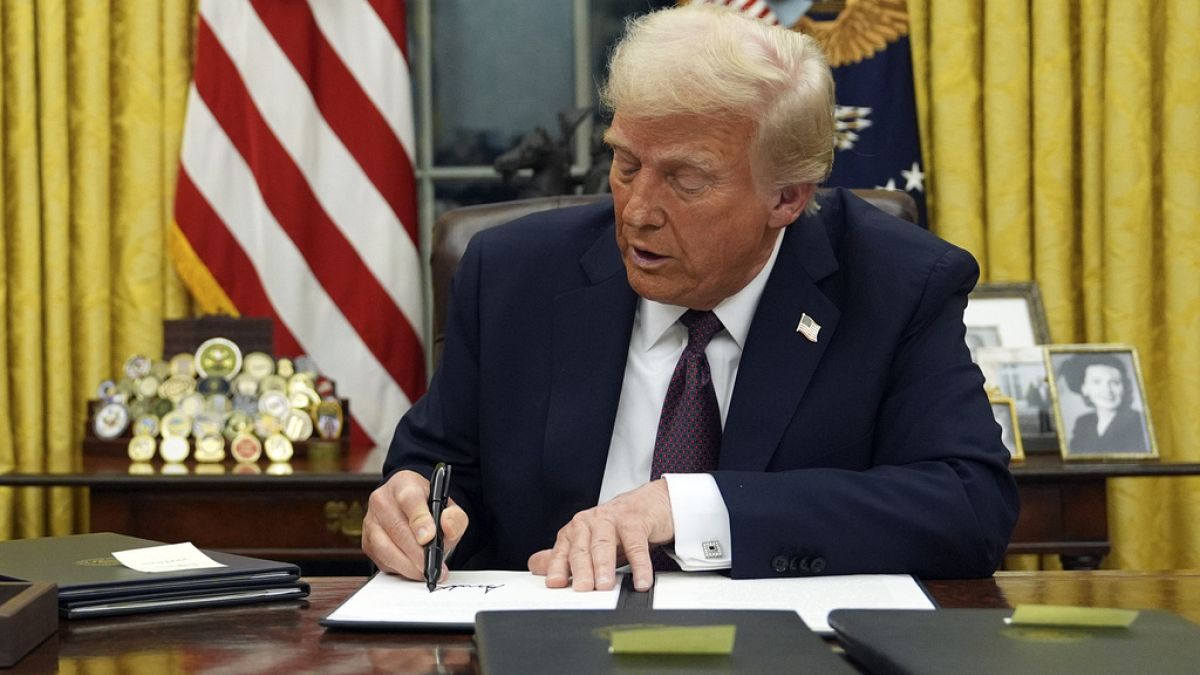Although hardly a surprise, President Trump’s executive decision to exit the international effort to halt global heating for a second time has been met with dismay on this side of the Atlantic.
A global agreement to limit global temperature rise remains “the best hope for all humanity”, European Commission president Ursula von der Leyen said at the World Economic Forum in Davos, a day after Donald Trump ordered the US out of the Paris Agreement on his first day back in the White House.
“All continents will have to speed up the transition towards net zero and deal with the growing burden of climate change,” von der Leyen told world leaders and the business elite who had flown into the exclusive Swiss mountain resort for the annual gathering.
“Its impact is impossible to ignore: heatwaves across Asia, floods from Brazil to Indonesia, from Africa to Europe, wildfires in Canada, Greece and California, hurricanes in the US and the Caribbean,” she said.
The EU’s climate commissioner, Wopke Hoekstra, who is also in Davos, reacted to von der Leyen’s words by regretting Trump’s move.
“It’s a truly unfortunate development that the world’s largest economy, and one of our closest allies in the fight against climate change, is withdrawing from the Paris Agreement,” Hoekstra said, stressing that the science on climate change was “crystal clear”.
“The Paris Agreement has strong foundations and is here to stay,” said Hoekstra, who is due later this year to propose a new target for greenhouse gas emissions by 2040, which EU scientists have said must be at least 90% below 1990 levels.
The US will soon rejoin Iran, Yemen and North Korea outside the 2015 agreement to halt temperature rise at ‘well below’ 2°C above the average in the half century to 1900, the end of the pre-industrial era. After a new record high last year, the world is already on the brink target of overshooting the 1.5°C aspirational limit.
In one of dozens of executive orders signed on the day of his inauguration, Trump wants the US out of any environmental deals that “steer American taxpayer dollars to countries that do not require, or merit, financial assistance”, and also calls for a halt to funding for the United Nations Framework Convention on Climate Change, which oversees implementation of the Paris deal and the annual COP summits.
Trump pulled the US out of the climate compact during his first presidency, only for Joe Biden to reverse the decision in 2020.
“We’ve been here before,” was UNFCCC executive secretary Simon Stiell’s reaction during a separate panel discussion in Davos today, and “the door remains open” if America wants to rejoin. “The world is undergoing an energy transition that is unstoppable,” Stiell said. “Last year alone over 2 trillion dollars was in the transition, and that compares to 1tn in fossil fuels.”
Trump dealt with fossil fuels in a separate executive order on “unleashing” America’s enormous oil and gas reserves, which he described during his inaugural speech as “liquid gold” that he would use to bring energy prices down at home and export “all over the world”. In yet another, he banned issuing of new permits for onshore and offshore wind farms.
MEP Michael Bloss, industrial and climate policy lead for the Greens, said Trump was “deliberately breaking with the global order” but also criticised von der Leyen’s to “take the lead” in global climate action ahead of this “foreseeable development”. Missing word here
“If Europe wants to retain its economic and geopolitical autonomy, it now needs a determined industrial strategy that specifically promotes innovation, accelerates transformation and brings Europe back onto the global stage as a single entity,” Bloss said.
There was also concern within the centre-right European People’s Party (EPP) – usually seen by the Greens as the most dangerous opponent of EU environmental policy.
“We are committed to the Paris Climate Agreement, we want to be climate neutral by 2050, [and] we want Europe to be the first climate neutral continent in the world,” EPP lawmaker David McAllister told Euronews
The Green Deal, which saw a raft of climate and environmental legislation adopted over the past five years, was “the way forward”, the German lawmaker said, while adding his group’s position that it all needs to be reviewed to ensure it does not “hamper our competitiveness”.
Tonino Picula, a Croatian MEP from the Socialists & Democrats group, said he saw “worrying” signs of “the Trump way of thinking” within the EU. “You can find in many corners of European Union…a lot of people who think that the Green Deal is something abstract and that it’s not import in [their] daily lives,” he said.
Adam Bieland, a Polish lawmaker from the eurosceptic ECR said Trump’s decision to quit the Paris Agreement on day one of his presidency had been the “sovereign decision of a new administration”. He slammed the EPP-aligned European Council president Donald Tusk for rejecting the idea of a special summit on EU-US relations floated by outgoing Polish president Andzej Duda.
Read the full article here


